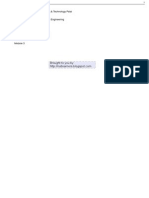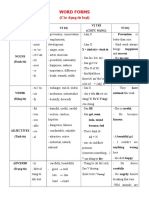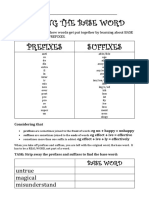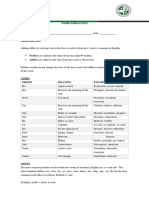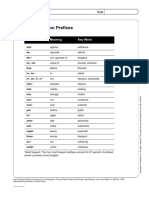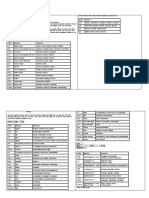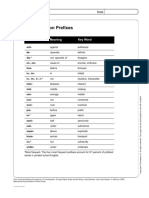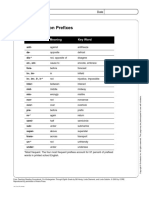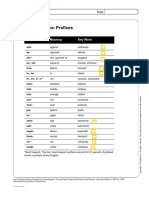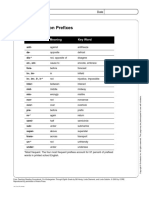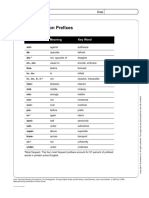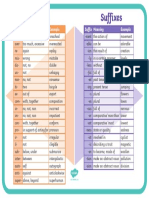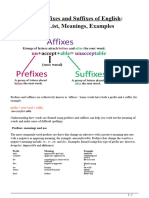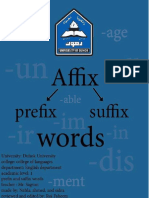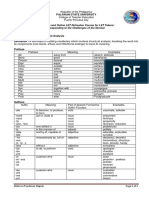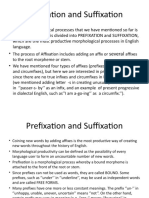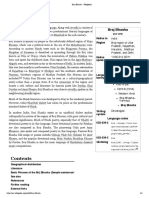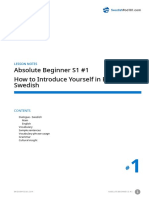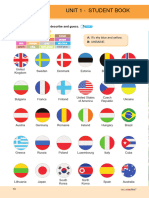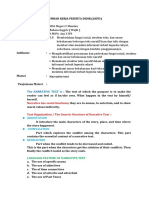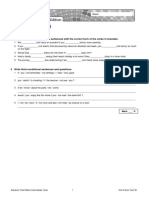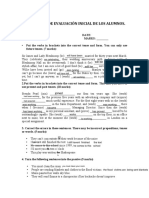0 ratings0% found this document useful (0 votes)
4 viewsThe Project of English
The Project of English
Uploaded by
Anoir DzThis document provides an overview of word building through prefixes and suffixes as well as verb tenses and forms. It includes tables that list common prefixes and their meanings, common suffixes and their meanings, the different verb tenses and forms, and examples of verbs in different tenses. The document provides a comprehensive reference for understanding how prefixes and suffixes can modify word meanings and how verbs are conjugated through tense and form.
Copyright:
© All Rights Reserved
Available Formats
Download as PDF, TXT or read online from Scribd
The Project of English
The Project of English
Uploaded by
Anoir Dz0 ratings0% found this document useful (0 votes)
4 views1 pageThis document provides an overview of word building through prefixes and suffixes as well as verb tenses and forms. It includes tables that list common prefixes and their meanings, common suffixes and their meanings, the different verb tenses and forms, and examples of verbs in different tenses. The document provides a comprehensive reference for understanding how prefixes and suffixes can modify word meanings and how verbs are conjugated through tense and form.
Original Title
the_Project_of_english
Copyright
© © All Rights Reserved
Available Formats
PDF, TXT or read online from Scribd
Share this document
Did you find this document useful?
Is this content inappropriate?
This document provides an overview of word building through prefixes and suffixes as well as verb tenses and forms. It includes tables that list common prefixes and their meanings, common suffixes and their meanings, the different verb tenses and forms, and examples of verbs in different tenses. The document provides a comprehensive reference for understanding how prefixes and suffixes can modify word meanings and how verbs are conjugated through tense and form.
Copyright:
© All Rights Reserved
Available Formats
Download as PDF, TXT or read online from Scribd
Download as pdf or txt
0 ratings0% found this document useful (0 votes)
4 views1 pageThe Project of English
The Project of English
Uploaded by
Anoir DzThis document provides an overview of word building through prefixes and suffixes as well as verb tenses and forms. It includes tables that list common prefixes and their meanings, common suffixes and their meanings, the different verb tenses and forms, and examples of verbs in different tenses. The document provides a comprehensive reference for understanding how prefixes and suffixes can modify word meanings and how verbs are conjugated through tense and form.
Copyright:
© All Rights Reserved
Available Formats
Download as PDF, TXT or read online from Scribd
Download as pdf or txt
You are on page 1of 1
WORD BUILDING (Affixation).
Prefixes Meaning suffixes Meaning
Un -en
De Verb
-ify
Dis formation
-ise/ize
in Negative/opposite of... -ment
il -ity
im -hood
ir -ism
anti Against -ion/ation
auto Of/ by oneself Noun
-er,or,ist,ian
bi Two/ twice formation
-ful
semi Half -ness
micro Very small -less
over Too much -ing
under Under-not enough -ee
sub Under -able
re Again-back -ible
in Inside-in -al
mono Single-one -an,ian,ese,ish
poly Several- many -ful
mis Badly-wrongly Adjective -ish
en-em(verb) one does something formation -less
ex Former(no longer) -ly
post After -ous
pre-ante Before -ed
counter Against -like
ultra-super Above-beyond -y
non Not
ab From-away -ly
Adverb
inter Among-between -ward
formation
mal Bad-wrong -wise
TENSE VERB FORM EXAMPLES TIME MARKERS
Stem I read – You study . everyday , always ,
Present Stem + s (he, she , it ) he studies - she does - it usually , often ,
Simple creeps sometimes , seldom
rarely , never
am I am working now , today, at this
Present
Is + ( stem + ing ) He is studying moment , this week
Continuous
Are They are hurrying these days , tonight
Present has ( stem + ed ) + He / She has studied . already , not yet , just ,
Perfect have irregular part 2.We, You, They have written since , for , never
Pre. Perfect Has +(been+(stem+ ing ) Liza has been walking .
Continuous have) 2. We have been sleeping .
stem + “ ed “ We played – He cried .
Past yesterday , last … , …
irregular She did – They fought . It
Simple ago , in 1978 .
rain
Past was + ( stem + ing ) She / I was jogging .
while
Continuous were 2. They / You were hurrying .
Past ( stem / ed ) had + I had arrived .
already , just , yet
Perfect irregular part 2. She had come .
Pas. Perfect had + been + ( You had been playing .
before , after , when
Continuous stem + ing ) She / You will lay the table
next … :next week, …
We / Shall talk .
Future in … : in the future, …
shall + stem will 2. She / I / They had been
Simple from now : five weeks
writing .
from now …
shall We / I shall be travelling . at : at 5 o’clock .
Future + be + ( stem + ing )
Continuous next : next week .
will 2. He will be sleeping .
in : in a month .
Future shall (stem + ed ) I / We shall have finished . Time word :
Perfect have + will irregular part 2. He will have left . when , by , before
Fut . Perfect shall + have been + 1.We shall have been working .
Continuous ( stem + ing ) will 2. She will have been studying .
You might also like
- Lec 3Document76 pagesLec 3kuku288No ratings yet
- Common Affixes and Their Meanings: PrefixesDocument2 pagesCommon Affixes and Their Meanings: PrefixesKim TaehyungNo ratings yet
- Unit 2 - English - WWW - Rgpvnotes.inDocument18 pagesUnit 2 - English - WWW - Rgpvnotes.inAustinNo ratings yet
- Word FormsDocument5 pagesWord FormsLam TranNo ratings yet
- Derivation WordsDocument3 pagesDerivation WordsHamidahNo ratings yet
- Common AffixesDocument2 pagesCommon AffixesАсем АлимоваNo ratings yet
- Słowotwórstwo - Ćwiczenia Repetytorium Express PublishingDocument34 pagesSłowotwórstwo - Ćwiczenia Repetytorium Express PublishingzuznixyzNo ratings yet
- Finding The Base Word Prefixes Suffixes: Untrue Magical MisunderstandDocument2 pagesFinding The Base Word Prefixes Suffixes: Untrue Magical MisunderstandGenieNo ratings yet
- Prefixes & Suffixes - Level B2Document7 pagesPrefixes & Suffixes - Level B2mikiauvieNo ratings yet
- Pre, AffDocument2 pagesPre, AffTrần Thị Kim NgânNo ratings yet
- Word Formation HandoutDocument3 pagesWord Formation HandoutMACARENA ANDREA ZAMORA MAC-MAHONNo ratings yet
- Word Building StrategiesDocument3 pagesWord Building StrategiesMOUGANGNo ratings yet
- 3º - 4º ESO Word FormationDocument2 pages3º - 4º ESO Word Formationcmvvmc100% (1)
- Clase 9. 01-06 Ticket PleaseDocument2 pagesClase 9. 01-06 Ticket Pleasetechbot3dNo ratings yet
- Most Common Prefixes: Prefix Meaning Key WordDocument2 pagesMost Common Prefixes: Prefix Meaning Key Wordrec4554No ratings yet
- Baigal-Ekh Vocabulary Building 1Document3 pagesBaigal-Ekh Vocabulary Building 1Egshiglen EgshiglenNo ratings yet
- Prefixes and SuffixesDocument2 pagesPrefixes and SuffixesSemaNo ratings yet
- Prefixes SuffixesDocument2 pagesPrefixes Suffixesapi-368766183No ratings yet
- Prefixes SuffixesDocument2 pagesPrefixes Suffixesakash767067No ratings yet
- SafariDocument2 pagesSafarikhonsotheary65No ratings yet
- Afijos Más Comunes en InglésDocument2 pagesAfijos Más Comunes en InglésChochi ZabalaNo ratings yet
- Prefixes SuffixesDocument2 pagesPrefixes Suffixesjose luis Mena palomequeNo ratings yet
- List Most Common Prefixes SuffixesDocument2 pagesList Most Common Prefixes Suffixesdianamariavasquezsolano631No ratings yet
- Prefixes SuffixesDocument2 pagesPrefixes SuffixesBaban SamantaNo ratings yet
- Prefixes & SuffixesDocument2 pagesPrefixes & Suffixesنجم البريهيNo ratings yet
- Prefixes Suffixes PDFDocument2 pagesPrefixes Suffixes PDFDamir GrudaNo ratings yet
- Prefixes SuffixesDocument2 pagesPrefixes Suffixesjaden.mw10No ratings yet
- Prefixes SuffixesDocument2 pagesPrefixes SuffixesPrathama AdrianNo ratings yet
- CauTaoTu PhanLoaiTuDocument3 pagesCauTaoTu PhanLoaiTunqbao1401No ratings yet
- Prefix and Suffix A3 PosterDocument1 pagePrefix and Suffix A3 PosterT.L. OrigamiNo ratings yet
- Prefix Meaning Examples: SuffixesDocument2 pagesPrefix Meaning Examples: SuffixesMark Kelley Beltran ObañaNo ratings yet
- Word Formation PARTS 1 & 2 Explanation and Some PracticeDocument4 pagesWord Formation PARTS 1 & 2 Explanation and Some PracticeLucas SeguinNo ratings yet
- Documento Sin TítuloDocument16 pagesDocumento Sin TítuloMaira OlivaNo ratings yet
- Book 1 Utepsa Ingles TecnicoDocument60 pagesBook 1 Utepsa Ingles TecnicoVJHJHVJHNo ratings yet
- Prefixes & SuffixesDocument6 pagesPrefixes & SuffixesLuminita DragomirNo ratings yet
- Prefix SuffixDocument1 pagePrefix SuffixShabnamNo ratings yet
- Prefixes and SuffixesDocument5 pagesPrefixes and SuffixesQuốc Bảo PhạmNo ratings yet
- Unit 5 Guessing Meanings of Unknown WordsDocument1 pageUnit 5 Guessing Meanings of Unknown WordsFelicito Rizal PutraNo ratings yet
- Present Perfect SimpleDocument2 pagesPresent Perfect SimpleAndrada ZumbilNo ratings yet
- AffixesDocument9 pagesAffixesSagvanNo ratings yet
- suffixes and prefixesDocument1 pagesuffixes and prefixesOANA MARIA MARINNo ratings yet
- Silibus Tahun 1-4Document2 pagesSilibus Tahun 1-4faizahabdullahNo ratings yet
- Derivation (Structural Analysis)Document2 pagesDerivation (Structural Analysis)Klein LibaoNo ratings yet
- Prefix Base Word New Word Prefix Base Word New WordDocument2 pagesPrefix Base Word New Word Prefix Base Word New WordJerome MetierreNo ratings yet
- Broucher 1Document3 pagesBroucher 1maherashraf660No ratings yet
- Wuolah Free FLIPBOOK GRAMMAR MAGA DE ILUSIONESDocument21 pagesWuolah Free FLIPBOOK GRAMMAR MAGA DE ILUSIONESMar lopezNo ratings yet
- Version To Share - IGCSE Latin Language RevisionDocument12 pagesVersion To Share - IGCSE Latin Language RevisionHannahNo ratings yet
- The Verb - "Be": Present Tense - Am, Is, AreDocument1 pageThe Verb - "Be": Present Tense - Am, Is, AreMaliNo ratings yet
- THE TOP 150 WORDS OF WRITTEN ENGLISH Dina Edith Fernandez ChoqueDocument2 pagesTHE TOP 150 WORDS OF WRITTEN ENGLISH Dina Edith Fernandez ChoqueAlberto FernándezNo ratings yet
- Tobeinthe To Have in The To BeDocument1 pageTobeinthe To Have in The To BeNemrac NemracNo ratings yet
- Prefixes and SuffixesDocument2 pagesPrefixes and Suffixesarfandi lumban gaolNo ratings yet
- Pre3fixation and SuffixationDocument17 pagesPre3fixation and SuffixationAnđaNo ratings yet
- CountablesDocument1 pageCountablesRo Castañares GuaitaNo ratings yet
- English Tenses ChartDocument1 pageEnglish Tenses Chartパス•クシメナ100% (1)
- 4.2 Grammatica ImperfettoDocument3 pages4.2 Grammatica ImperfettoGunay IsmiyevaNo ratings yet
- Prefix Meaning ExamplesDocument3 pagesPrefix Meaning ExamplesGopa BhattacharyyaNo ratings yet
- Affixes and Roots by Grade Level - HJLEEDocument22 pagesAffixes and Roots by Grade Level - HJLEE발음교정No ratings yet
- Advanced French Verb ChartDocument3 pagesAdvanced French Verb ChartHammad Aqeel100% (1)
- Nov29,21 4 EnglishlessonDocument10 pagesNov29,21 4 EnglishlessonIsrael VázquezNo ratings yet
- Suffix and PrefixDocument12 pagesSuffix and Prefixneth.u.22967No ratings yet
- Secondary Parts of The SentenceDocument3 pagesSecondary Parts of The Sentencestu2203598065No ratings yet
- Braj BhashaDocument4 pagesBraj BhashaspiraldaoNo ratings yet
- S1 L1 How To Introduce Yourself in Excellent SwedishDocument5 pagesS1 L1 How To Introduce Yourself in Excellent SwedishKrrish GuruNo ratings yet
- 1er Bimestre Ingles - 1ro SecundariaDocument20 pages1er Bimestre Ingles - 1ro SecundariaLisset yoselin Huerta cusquiNo ratings yet
- Phonology & Morphology MLA Research PaperDocument6 pagesPhonology & Morphology MLA Research PaperAries Riad33% (3)
- B1 Grammar U10Document22 pagesB1 Grammar U10jefferson torresNo ratings yet
- ChineseDocument21 pagesChineseKhuong Lam0% (1)
- Kannada English Lesson-7Document6 pagesKannada English Lesson-7raghunandhan.cvNo ratings yet
- LKPD - Narrative Text - KLS X - SMR 2Document2 pagesLKPD - Narrative Text - KLS X - SMR 2αɠɳเα ɳμɾμl เรlαɱเNo ratings yet
- English PlosivesDocument11 pagesEnglish PlosivesRose GreenNo ratings yet
- Lesson3-Simple PresentDocument6 pagesLesson3-Simple Presentnico ryNo ratings yet
- Learn Sanskrit IntricasiesDocument4 pagesLearn Sanskrit IntricasiesRudraNo ratings yet
- Tablet of Contents: Present Continuous TensDocument7 pagesTablet of Contents: Present Continuous TensAshley Ribeiro100% (1)
- ALPHANUMERIC SeriesDocument6 pagesALPHANUMERIC SerieskumareshNo ratings yet
- Bahasa Inggris - Tenses Meeting 2Document13 pagesBahasa Inggris - Tenses Meeting 2miryan mapauNo ratings yet
- Unit 9 Short Test 1B: GrammarDocument2 pagesUnit 9 Short Test 1B: GrammarСоня НизовцоваNo ratings yet
- Kelly Fiorella Giron AlamoDocument6 pagesKelly Fiorella Giron AlamoJose Armando Aguilar RamirezNo ratings yet
- National University of Modern Languages: English Verb: MoodDocument18 pagesNational University of Modern Languages: English Verb: Moodwaqar younasNo ratings yet
- Upper Intermediate S1 #20 at The Heartbreak Motel in The US: Lesson NotesDocument6 pagesUpper Intermediate S1 #20 at The Heartbreak Motel in The US: Lesson NotesNokosNo ratings yet
- SupraDocument3 pagesSuprazairazahid569No ratings yet
- Russian Sec 2024-25Document2 pagesRussian Sec 2024-25Shreyansh MishraNo ratings yet
- EXERCISESDocument2 pagesEXERCISESYadira BelenNo ratings yet
- Reported Speech HandoutDocument3 pagesReported Speech HandoutDr.S.K. YadavNo ratings yet
- TRAVELLER C1 U 7 8Document5 pagesTRAVELLER C1 U 7 8MAMANI LIZNEIDYNo ratings yet
- Vowels and ConsonantsDocument12 pagesVowels and ConsonantsGungeetNo ratings yet
- Narrative TextDocument16 pagesNarrative TextFelicia VidiaNo ratings yet
- GE - English TQ - MontesRemarDocument4 pagesGE - English TQ - MontesRemarReeymarNo ratings yet
- Tematik Smiles 3Document5 pagesTematik Smiles 3Elena FushaNo ratings yet
- Reflection On English PhoneticsDocument8 pagesReflection On English PhoneticsPhuongUyen Pham100% (1)
